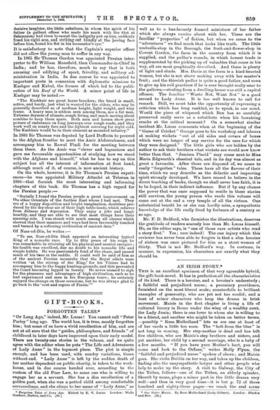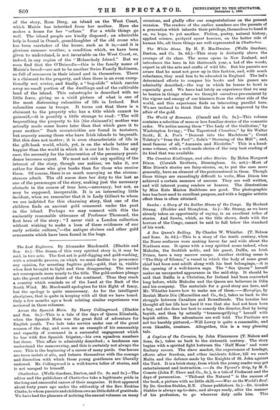AN IRISH STORY.*
THis is an excellent specimen of that very agreeable hybrid, the gift-book-novel. It has in perfection all the characteristics of its kind. There is a heroine, and a heroine's understudy ; a faithful and prejudiced nurse; a pecuniary providence, furnished on the most liberal scale; counterfoils to brilliant examples of generosity, who are yet not too sordid; and a host of minor characters who keep the drama in brisk movement. Maisie in the first chapter is living a life of cultured luxury in Rome under the wing of a wealthy aunt, the Lady Junia; there is one lover to whom she is willing to be a friend, and another who might be taken on better terms, —possibly " Rosa Mulholland" lets us see one at least of of her cards a little too soon. The "bolt from the blue" is not long in coming. Her step-mother is dead and has left five children, who are Maisie's step brothers and sisters, and yet another, her child by a second marriage, who is a baby of a few months. "If you have yure Mother's hart, you will come and look to the Orfans," writes Molly Flynn, the "faithful and prejudiced nurse" spoken of above; and Maisie goes. She visits Dublin on her way, and takes up the children, finding also the unsympathetic lawyer and other people who help to make up the story. A visit to Galway, the City of the Tribes, follows—one of the Tribes, an elderly spinster, Skerrit by name, plays a minor part in the little drama very well—and thus in very good time—it is but p. 72 of three hundred and eighty-three pages—we reach the real scene 6 Our Sister Maisie. By Boma Mulholland (Lady Gilbert). London : Moms and Son. [Si.] of the story, Rain Berg, an island on the West Coast, which Maisie has inherited from her mother. Here she makes a home for her " orfans." For a while things go well. The island people are kindly disposed ; an admirable help is found in Oonah, granddaughter of the old crone' who has been caretaker of the house, such as it is,—and it is glorious summer weather, a condition which, we have been given to understand, is not invariable on the West Coast, or, indeed, in any region of the "Melancholy Island." But we soon find that the O'Driscolls—this is the family name of Maisie's brood—are not to be another Swiss Family Robinson, so full of resources in their island and in themselves. There is a claimant to the property, and then there is an even excep- tionally wet winter, and finally, a "bog-slide" which carries away no small portion of the dwellings and of the cultivable land of the island. This catastrophe is described with no little force, giving us a vivid picture of what is one of the most distressing calamities of life in Ireland. But calamities come in troops. It turns out that there is a claimant to the property who has a title which cannot be gainsaid,----it is possibly a little strange to read: "The will bequeathing the property to his [the claimant's] mother was actually made some hours later than that which gave it to your mother." Such eccentricities are found in testators, but scarcely among those who have Irish islands to bequeath. But this does not matter ; it is even characteristic of life in the gift-book world, which, yet, is on the whole better and happier than the world in which it is our lot to live. In any case, the necessity for the intervention of the pecuniary provi- dence becomes urgent. We must not risk any spoiling of the interest of the story, though our notices, we take it, are rather for those who give books than for those who receive them. Of course, there is as much marrying as the circum- stances admit. The old nurse does her duty to the last as one of the personages of the story, making just the necessary obstacle in the course of true love,—necessary, but not, as may be supposed, insuperable. It is an interesting little incident, when we remember that it is Lady Gilbert to whom we are indebted for this charming story, that one of the children finds an ancient gold ornament under the peat in the island. Perhaps we may connect with this the eminently reasonable utterance of Professor Thomond, the first hero of the story : "I never visit a London collection without wishing to make a loan of these evidences of our early artistic culture,"—the antique shrines and other gold ornaments which have been found in the bogs.































































 Previous page
Previous page